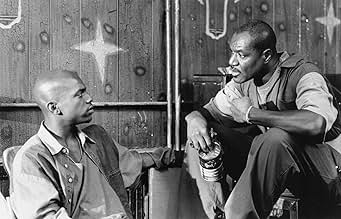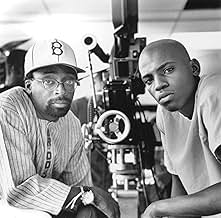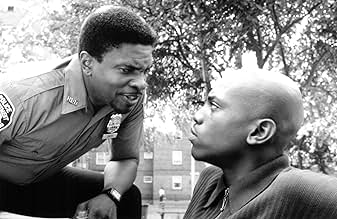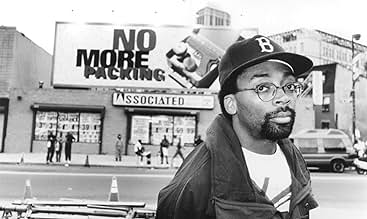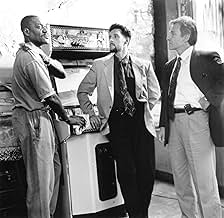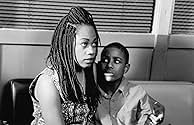Jovens traficantes de drogas dos conjuntos habitacionais do Brooklyn vivem vidas duras e perigosas, presos entre seus chefes do tráfico e os detetives que querem detê-los.Jovens traficantes de drogas dos conjuntos habitacionais do Brooklyn vivem vidas duras e perigosas, presos entre seus chefes do tráfico e os detetives que querem detê-los.Jovens traficantes de drogas dos conjuntos habitacionais do Brooklyn vivem vidas duras e perigosas, presos entre seus chefes do tráfico e os detetives que querem detê-los.
- Prêmios
- 6 indicações no total
- Tyrone
- (as Pee Wee Love)
- Errol Barnes
- (as Tom Byrd)
- Go
- (as Fredro)
- Horace
- (as E.O. Nolasco)
- Sharon
- (as Lisa Arrindell Anderson)
Avaliações em destaque
Instead of characters with overt prejudices and plain racial allegiances-characters that are sterile symbols of bigotry rather than credible humans guilty of it-Lee gives us characters of casual racism. Most representative of this is Harvey Keitel's Rocco Klein, a white detective who cannot understand the culture surrounding him, which is a culture of narcotics, violence, and black-on-black crime. On his beat, drugs are less a problem than a lifestyle, murder resolves the tiniest of disagreements, and young mothers valiantly but vainly battle the influence young dealers have on their sons. Klein views the inner-city with contempt, but deep down he knows all the whores and dealers are human beings, too.
Klein is introduced at the scene of a homicide, where the police handle the gruesome death with a clinical sense of detachment, cracking bad jokes and asking the bloodied corpse questions. Is it just a job, or is it racism? For Klein, it's both: he needs the gallows humor to psychologically deal with this culture of depravity. What's fascinating about CLOCKERS is Lee's willingness-and guts-to present Klein, despite his prejudice, as the film's hero. Lee understands that casual racism is simply endemic and inescapable in American culture. What he appreciates is Klein's ability to transcend his own prejudice and finally do the right thing.
The way I see it, this is being a pretty good portrayal of live on the streets in the '90's. It picks a mostly realistic approach but still I just can't really 'feel' this movie. I never felt involved with any of the characters in it or to any of the dramatic events and developments. It doesn't make this movie bad but it does indeed make this movie a bit of a one dimensional experience.
And remember, this is an 1995 movie. So everything that was considered to be hip and 'thug life' might seem a bit ridicules and less cool in today's perspective. The whole attitude and way of talking and the way everyone dresses makes this movie really a product of its time. In that regard this movie also really reminded me of "Kids", which coincidentally or not, got made in the same year as this movie. It makes this movie less relevant to watch now days but really, it's nothing I was holding against the movie.
I would had most definitely preferred it if this movie was using a more straightforward style of storytelling. The movie as it is seems to be wanting to focus on far too many different characters and tries to do and tell too much. It also really has its own style to it, when it comes down to its storytelling, which was nice and helped to give this movie an unique feeling but at the same time it also made the movie unnecessary hard and not all that pleasant to follow at times.
Another thing I also disliked about this movie was its pick of music. The movie mad some bad music choices, in which the music often would swell and become melodramatic at moments that really were uncalled for. It absolutely distracted and most of the time didn't suit what was happening on the screen at the time.
But really, I though this movie still had some hints of a great movie in it as well. One thing was its already earlier mentioned unique and distinctive style. Spike Lee always has had an unique and distinctive style of his own and he manages to put a lot of that in this movie successfully. There are some interesting moments in this movie, from a more technical and movie-making perspective. There was some good camera-work for instance and also very little wrong with the movie its editing and pacing.
The movie its story in essence also really seemed to be a solid one but I do feel that they perhaps should had picked some different perspectives to keep- and make things a bit more interesting and effective. Wouldn't this movie for instance had been better and more interesting if it told things more from the Harvey Keitel's character perspective? Who knows and it's not like the movie bad or interesting as it is right now but while watching this movie it constantly gave me the feeling it had more potential and things could had been done better.
I don't know, perhaps the movie was also being a bit stuck between being a gangster movie and a more realistic one. It never felt like a true gangster flick and it never felt like a true realistic movie neither. Producer Martin Scorsese perhaps should had stepped in a bit more often, since he definitely is a kind of director who can more successfully blend realism with tough and tense gangster/crime movies.
Not trying to sound too negative. The movie is good enough as it is but it doesn't ever reaches its full potential.
7/10
http://bobafett1138.blogspot.com/
Clockers has a main plot that pushes along, as the murder by multiple gun-shots of a Darryl, black fast-food worker, who was also apart of the crew of Rodney (Delroy Lindo), call into question who might have done it. At first, it seems pretty open and shut, as Victor (Isaiah Washington) comes forth and admits he did it in self-defense. Rocco Klein (Harvey Keitel) doesn't buy it, seems too easy, so he asks around, digs deeper, and sees that his brother, Strike (Mekhi Pfeifer) seems to be much more of the guilty party, by way of how he handles himself in the streets, his repore with Rodney, and as having more motive to kill Darryl. It's through this that Lee then branches it out to make it as much as character as about plot, where the ties between certain characters, like Strike and Tyrone, a pre-teen who looks up to Strike like a surrogate father, are mostly defined by how the neighborhood works out in the open. The clockers are bunch of would-be gang-bangers who talk a lot of talk, but haven't walked nearly as much as Earle, best friend of Rodney's and psychopathic murder, or Rodney himself, who has that veneer of being like the one you can trust the most- half surrogate father as well and half good cop/bad cop boss- until he gets crossed.
Although Price's material, which comes through with the energy and occasional wit, is noticeable throughout, it's really Spike Lee as director and many of the actors who make this a consistently watchable movie. Lee is never one to be too subtle with the camera, and he has variations with how he deals with the material to make it very observant but also subjective. Early on, for example, we see the clockers making their deals in the park in long-shot, shaky, as if Lee's filming it far away for a reality TV show. But then we also see the 360 degree camera moves as Klein questions Strike. There's many camera moves that are practically trademark Lee shots, especially with the lighting, as Klein questions Tyrone, or when we see a flashback to Victor having to deal with some clockers. It's all very flamboyant and meant to call attention to the material, and aside from a few unneeded music choices (it's the only time you'll hear Seal in a drug dealer crime movie), he's on top of things. Meanwhile, the performances are all top-notch, usually, as Keitel and particularly Lindo play their characters so well by pretty much being how we think the actors 'really' are, even though they're not. Pfeifer has a little trickier a time with his performance, because he usually is on a very similar note: I didn't do nothing, is his usual beat. His character also has the intriguing qualities that mark him as something of an outsider however in he might be: his stomach virus, which is never resolved but always looming over him, and his love of electric train-sets.
And all the while, Clockers succeeds in presenting a time and place where there should be little to no hope, and it makes the cops and criminals both pretty well-rounded when compared to other genre films. The cops are meant to be the good guys, but there's also a steady conflict between Klein and his partner: why should Klein care so much as to who did it or why (Strike also asks this question towards the end, in one of the best scenes in the film)? And Strike and Rodney are not cut-outs from black exploitation flicks, but with more of a push and pull tie that is always a threat, never a comfort. There are little details that help make Lee's film interesting when it veers into being like a television serial; the white yuppies who get entangled in the case; the over-protective but very smart cop (Keith David, always a pro) who also tries to play surrogate father to Tyrone, albeit without the same care, however negative, as Strike has; the brief shots of the drug addicts with their habits on display, as we only need to see it for less than a minute to get the nature of the bottom of the food chain, which is total despair. Lee's film, however, isn't really disparaging as it has moments of hope, yet a hope meant to be in understanding that there's no easy way out of all of this.
Você sabia?
- CuriosidadesWas originally supposed to be directed by Martin Scorsese. Rocco Klein would have been the main character, played by Robert De Niro. Scorsese changed his mind, opting instead to direct Cassino (1995), and De Niro went with him. Scorsese then asked Spike Lee if he wanted to direct. Lee accepted (and decided that Strike, not Rocco, would be the primary character), and Scorsese was given an "Executive Producer" credit.
- Erros de gravaçãoWhen Detective Mazilli is walking up to the back of the Mercedes Benz to talk to the kids inside his badge/shield is that of an NYPD Detective. However when he shows it to the driver of the car it is the shield of a NYPD Sergeant.
- Citações
Rodney: If God created anything better than crack cocaine, he kept that shit for hisself. I mean, that shit is like truth serum. It will truly expose who you are. I mean, you happen to be a low-life rat bastard motherfucker, who will sell off his newborn for a suck off that glass dick, crack will bring it right on in the light. Now, I don't care you black, white, Chinese, rich, poor. You take that first hit, you on a mission. And that mission will never end. Even when the house, the money, loved ones are gone, they send you to the joint, you still gonna try to cop.
Ronald 'Strike' Dunham: No doubt.
Rodney: Only time it ends, Strike, that mission, when you six feet under.
- ConexõesFeatured in Crooklyn Dodgers: Return of the Crooklyn Dodgers (1995)
Principais escolhas
- How long is Clockers?Fornecido pela Alexa
Detalhes
- Data de lançamento
- País de origem
- Idioma
- Também conhecido como
- Clockers: Hermanos de sangre
- Locações de filme
- Empresas de produção
- Consulte mais créditos da empresa na IMDbPro
Bilheteria
- Orçamento
- US$ 25.000.000 (estimativa)
- Faturamento bruto nos EUA e Canadá
- US$ 13.071.518
- Fim de semana de estreia nos EUA e Canadá
- US$ 4.463.560
- 17 de set. de 1995
- Faturamento bruto mundial
- US$ 13.071.518
- Tempo de duração2 horas 8 minutos
- Cor
- Mixagem de som
- Proporção
- 1.85 : 1
Contribua para esta página



